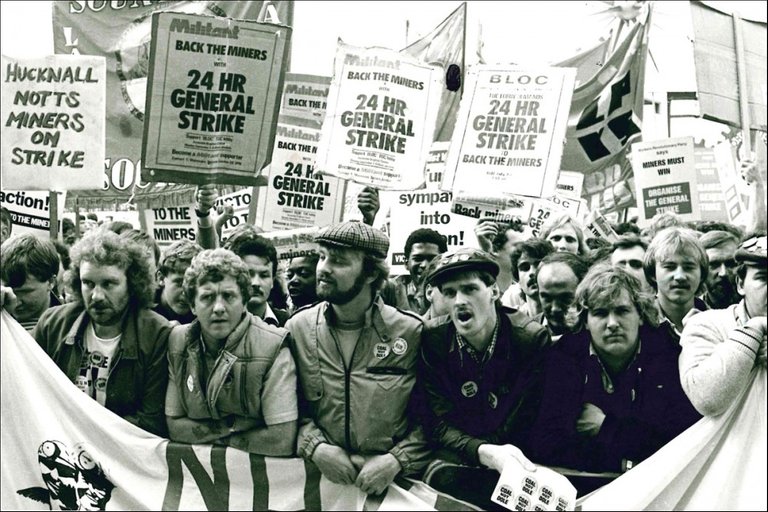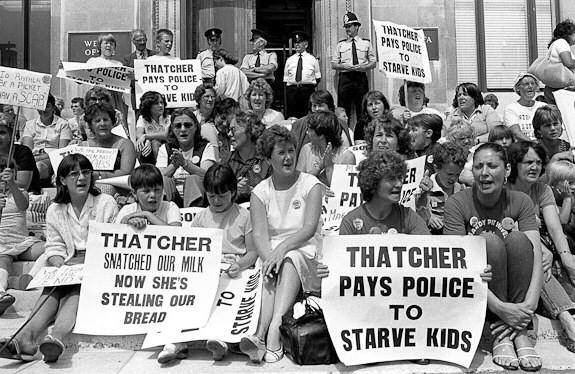When it comes to mass political protest, strikes (and not rallies) are the most effective means to push any crucial demands, political or economic. Crowds in the streets can be ignored, power outages and paused production, trade, transportation cannot.

Picture credits: David Sinclaire
In early March 1984, the National Coal Board announced that British coal was no longer needed - if necessary, coal could be brought from South Africa, and imports from socialist Poland were cheaper than paying British miners at British rates. The “modernization” of the industry meant the closure of 20 mines and firing 20 thousand miners with no retraining programs offered to the workers.
In response, on 12 March, the National Union of Mineworkers announced the strike in all coal mines. Earlier, in 1974, the strikes of miners simply had torn the British economy apart: - three-day working week was introduced throughout the country, shops closed at 2 pm, television was broadcasting for half a day, houses were lit with candles. No one expected that coal would stop arriving at power plants. Prime Minister Edward Heath had to resign.
Ten years later, trade unions were eager to repeat this feat and act the role of "kingslayers" on the English soil. Thatcher’s government intended to take revenge and wipe out the organized trade union movement from the face of the Earth. It’s known today that the British government was getting prepared for the strike and provoking the miners to uprise, knowing that the winter would be warm, knowing that the strategic coal reserves would make it possible to last until next spring. The miners were incited to act as early as possible, as the government threw threats at press conferences and sent no representatives to negotiations.
The information coverage of the strike was coordinated with the BBC and the largest newspapers, we know that MI6 was monitoring all the leaders of the trade union movement and the labour miners, suspecting them of cooperation with the Soviet Union and the KGB, The protesters were called "the inner threat" and "the nationwide enemies".
Sadly, after the strike failed, between 1985 and 1995, not 20 (as it was initially promised by the officials), but 170 mines were closed. In the spring of 1985, when the desperate strikers started negotiations, the country's coal reserves would last for less than a month.
But it doesn't really matter. It's 2019, history is covered with dust, but it's always interesting to see if tens of thousands of people went on strike for a whole year, if the strike was outlawed, if the government froze the miners' mutual aid funds, announcing that they were funded by the Soviet Union, if the employer, of course, did not pay maintenance during the illegal strike ... then how did these tens of thousands of workers last for a whole year?
Because they were helped by everyone who could raise money. And all the more surprising is the story of the Lesbians and Gays in Support of Miners (LGSM) movement.
When the bank accounts of the strikers were frozen throughout the country, postal orders or bank transfers became meaningless. Delegates from the miners' trade unions set cans in the country pubs to collect small change. The wives or children of the strikers stood in the streets with placards or sold badges and flags with the symbols of the strike: cash payments could not be taken away.
At about the same time in 1984, a gay pride parade in London ran into a large group of miners on a narrow street. But instead of insults and fights, sudden fraternization began. Miners, gays and lesbians suddenly realized that they were an oppressed class and therefore had to help each other.
“TV mocks them - just like us!”
“They resist - as we do!”
“The goal is to change the social and economic system of the country!”
The LGSM founding member Mark Ashton said, “Mining communities are being bullied like we are, being harassed by the police, just as we are. One community should give solidarity to another. It is really illogical to say: ‘I’m gay and I’m into defending the gay community but I don’t care about anything else.”
As a result, the idea to support the oppressed mine workers with money grew nationwide. Donations were made by Elton John and Paul McCartney, who often spoke during their concerts about where Maggie Thatcher should go.

Picture credits: Peter Franklin, LGSM member
The struggle, which began as a movement against the closure of mines, quickly grew into a general movement of resistance to the government - for the right to assemble, for the right to organize circles, for the right to freely discuss employers, etc.
There was a beautiful reaction from the protesters after the SUN came up with a witty (in its opinion) headline about "Pits and Perverts",
“The Sun clearly intended to undermine the striking miners’ cause and ridicule or belittle its support from lesbians and gay men. In fact, they ended up having exactly the opposite effect.” writes the Morning Star.
The ugly headline united the comrades from gay clubs and the comrades from the coal mines. “The so-called perverts appropriated that headline as the title of a massive fundraising event organised by Ashton’s LGSM at the Electric Ballroom in Camden, London.
The concert itself was a huge success — raising £5,650 (the equivalent of more than £20,000 in today’s money) for the striking miners and their families in South Wales.”
Miners who spoke badly of their "different" coworkers, to everyone's surprise, now often met friendly kicks and slaps in the pubs - until these people realized that everyone should be respected. A DJ at the radio station could suddenly lock himself in the studio and give out a half-hour speech about how, "while we are listening to rock here, workers are standing nearby and their families starve."

It's remarkable that this friendship lasted much longer than the strike itself - the established contacts with the LGBT community allowed the labour movement to easily accept the ideas of the 90s about equality. The LGBT activists, in their turn, still find it gross to vote for conservatives or speak badly of the working-class people.
An archive of cooperation between miners and LGBT activists is preserved at the National Museum of Labor History in industrial Manchester - along with union banners and newspaper clippings. The British drama movie "Pride" which tells the whole story of this union was released in 2014.
Translated from Russian by @olivera-despina
Your post has been curated by us! Received 20.00% upvote from @opb. Do consider delegate to us to help support our project.
Do join our discord channel to give us feedback, https://discord.gg/bwb2ENt
* This bot is upvoting based on the criteria : 1. Not plagiarised, 2. Persistent previous quality posts, 3. Active engagement with other usersDo upvote this commment if you 💚 our service :)